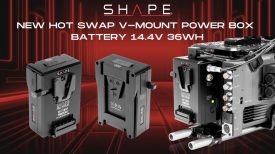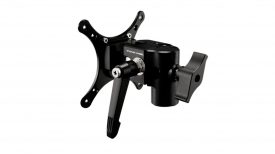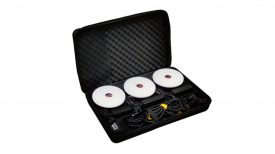
There is a long list of variable ND filters that are available in the market, and the latest ones come from Moment. Moment is a US company based out of Seattle that sells a wide array of different products.
They are mainly known for their smartphone lenses and filter packs for drones and phones.
This is their first venture into making variable ND filters for lenses with front filters diameters up to 82mm. With so many variable ND filters on the market, why did Moment decide to make their own?
So why make one?
According to Moment, ‘They were either too expensive or the quality wasn’t there. None of them hit the sweet spot on affordability, functionality, and quality…so we made our own.’

I’m going to play the devil’s advocate and say that is what every company says that starts bringing out variable ND filters. Now to be perfectly clear, there is absolutely nothing wrong with saying that, but the product has to live up to those expectations.
Limited Range
Now, there is a bit of a caveat with these filters. They are only offered in 2-5 stop (ND4 – ND32) and 6-9 stop (ND64- ND512) ranges. I found this to be somewhat of a problem. In a lot of cases, 5 stops weren’t quite enough when I was shooting outdoors on a sunny day. This meant that I was constantly switching back and forth between the 2-5 stop and the 6-9 stop versions of the filter. With other variable ND filters that offer from 1/1.33 up to 6-8 stops, this is something you don’t have to do. On the flip side of that argument, having two filters does offer you a lot more range than most single variable ND filters are capable of.
The whole reason for making two filters instead of one and keeping the stop range small is to avoid cross-polarization. Cross-polarization happens with some variable ND filters that have a large range. It basically means that the front and rear pieces glass reach a point where they cross each other in a sort of x pattern.
Speaking of the minimum amount of ND, most variable ND filters start at either 1 or 1.33 stops, the Moment starts at 2. The trouble is, you often just want a little bit of ND on overcast days and 2 stops are going to be too much on some occasions.
As the Moment Variable ND filters only have a limited range of stops, it doesn’t make them as versatile as a lot of other available options. It also means that you have to carry around 2 filters instead of just one if you want to cover most lighting conditions.
I am starting to see a trend of manufacturers bringing out Variable ND filters in two strengths. this is exactly what Freewell does with its variable ND filters.
What filter sizes are they available in?

You can get the Moment Variable ND filters in sizes from 67mm-82mm.
Build Quality
The filters come in a really nice metal case. This provides a nice first impression for the customer. It also provides a good amount of protection for storing your filter.
The Moment Variable ND filters are made out of machined aerospace-grade aluminum. The glass being used is Schott B270 Pro Cinema Glass. Schott glass is used by a lot of filter manufacturers.
The filters are nicely designed. They are relatively thin and most importantly the design allows you operate the filter quite easily.

I like the large front rim on the filter as it allows you to make adjustments without your fingers getting anywhere near the glass.

The ND stops are labeled on the filter and there is a little indent that lets you line up a particular stop that you require.

Moment say’s, ‘Our Variable ND Filters also feature a unique flared geometry unlike anything else on the market, allowing you to see your ND number from behind the viewfinder. This provides fast, precise control over your shots in tricky lighting, without moving from behind the camera.’ While this may be true when using small mirrorless cameras, with a camera such as the Panasonic S1H you can’t see the markings when using the viewfinder.

A lot of people shooting video aren’t using the viewfinder and are instead using the camera’s LCD screen or an external monitor. The ND markings are not always going to positioned in the same spot when you use step-up or step down rings. In fairness, I don’t think a lot of people actually look at markings on a variable ND filter when they are shooting.
In a nice touch, the filters work with the standard center pinch lens caps you may already have for your camera lens, unlike other options on the market. The thing is if you buy an 82mm variable ND filter and use step-up rings as I do, you don’t have any 82mm lens caps. With a filter like the SLR Magic, you actually get a lens cap that comes with the filter. I would have preferred to have seen Moment include a cap for the filter.
Are the markings accurate?

The Moment Variable ND filters are marked in strengths and not in stops. To see if they are accurate I exposed an image correctly without any ND to give me a reference F stop from which to start. I then attached the Moment filter to check the accuracy of the markings. I did this by using an X-rite Color Checker chart and a monitor with false color. This way I could make sure that the exposure being obtained was identical when using the ND filter.
As an example, if my reference was F11, if I added 2 stops of ND (ND4) I should get a properly exposed image by opening the iris to F5.6.
I found at 2 stops it wasn’t accurate. I had to open the iris to F4.5 to get the same exposure as my reference image, the correct exposure should have been F5.6 Once I moved to 3 1/8 stops (ND8), I needed to open the iris to F5.0, which was pretty close to being accurate. At 4 stops (ND16) it gave me a reading of F4.5, it should have been F5.6. At 5 stops (ND32) it gave me a reading of F3.5, it should have been F4.

These tests showed me that the markings are not entirely correct. They aren’t massively off, but they are nowhere near being dead-on accurate. I would, however, note that most people are not going to be looking at what strength of ND they are running when using a variable ND filter. You just make adjustments based on what gets you correct exposure.
How do they perform?

No ND (reference image) 
Moment ND4 
No ND (reference white) 
Moment ND4
The Moment Variable ND filters are not completely color neutral, but few variable NDs are. While they are accurate on scopes I found that the overall look of the image was slightly green. That’s not to say there is a lot of green, but it is there.
It’s not that the color shift is bad, but you do have to keep in mind when using the filters that the overall look of your image will change.
So how does the stronger 6-9 stop filter fare? Above you can see a short clip comparing the filter at its maximum setting of 9 stops to when no ND is being used. I have to say, the filter performed really well, and considering I set it at its maximum of 9 stops It still remained very color neutral. This was impressive.
In 2020 there aren’t that many bad variable ND filters. Even cheaper options tend to produce good results. When choosing a variable ND filter it really comes down to what strengths you need, the build quality, and the usability of that filter.
How do they compare to other variable ND filters?

I decided to pit the Moment against the Freewell variable ND filters and my personal favorite, the SLR Magic 82mm Self-Locking Variable Neutral Density 0.4 to 1.8 Filter (1.3 to 6 Stops). Now, the Moment and the Freewell only go from 2-5 stops, but the SLR Magic goes from 1.3-6. In theory, the Moment and Freewell should have the advantage because they only have to cover 4 stops, while the SLR Magic needs to cover 5.7 stops.
The trouble with the SLR Magic filter is it is badly marked. Despite offering 1.3 to 6 stops of ND, the filter is marked from 1-10. I’m not sure why they did it this way, it makes no sense. I needed to do a bit of math to work out where 2,3,4 and 5 stops fell.
I did a test where I white balanced a Panasonic S1H with no ND and shot an X-Rite color checker chart. This gave me my reference image. I then tested out the Moment, Freewell, and the SLR Magic at a variety of stops to see if there was any color shift.
All of the filters have slight color shifts. The SLR Magic and Moment are pretty close (both have a slight push towards green), while the Freewell has just a little bit more green than the other two. What is interesting when you do these sorts of tests is that just because something looks good on a scope, doesn’t mean the image actually looks pleasing to the eye.
Now, whether you like how the colors were being replicated on the color chart is a personal decision. White was still white, black was still black, but the overall look was a little greener and warmer than that of the base image that was white balanced with no ND being used.
The Moment’s color response remained fairly neutral across its 2-5 stop range. It looks basically identical at ND4 as it does at ND32. This doesn’t surprise me though, as 2-5 stops of ND is not a lot. You usually only see drastic color changes when higher strengths of ND are used.
With the Freewell, the color response was also fairly neutral across its entire range, but it wasn’t quite as good as the Moment.
With the SLR Magic, the image was very neutral across the 2-5 stop range that was tested. In my opinion, it was slightly better than the Moment, but in saying that, you would be hard-pressed to pick real-world differences between all three of the filters. I would recommend when you apply any ND filter, variable or fixed, that you do a white balance.
Price

The Moment Variable ND filters retail for $149.99- $169.99 USD each depending on the size. A pack that includes a 2-5 stop and a 6-9 stop filter retails for $279.99- $319.99 USD depending on the filter size.
How does this price compare to the competition?

There are so many variable ND filters out there on the market, and I’m not going to list everyone. Below is a list of some of the other available options.
Conclusion

The Moment Variable ND filters produce good results. In one way I like that the filters won’t cause any cross-polarization, but on the other hand, the ranges of 2-5 stops and 6-9 mean you will be constantly swapping over filters.

The filters are competitively priced and the price positions them in the middle of the pack. There are certainly more affordable and much more expensive options available. I found them to be well made and designed and like how they come in a metal case.

Moment has done a pretty good job with these filters and they are fairly color neutral, even at their highest strengths. If you are in the market for a variable ND filter they are certainly worth considering.
What variable ND filters do you use? We would love to hear from you so please let us know in the comments section below.
Like what we do and want to support Newsshooter? Consider becoming a Patreon supporter and help us to continue being the best source of news and reviews for professional tools for the independent filmmaker.














